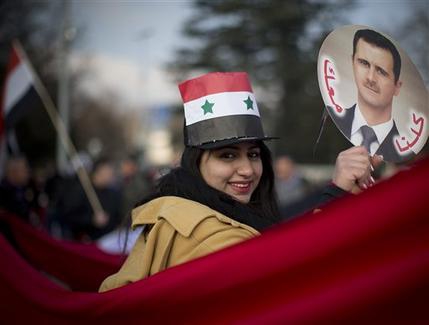 GENEVA (AP) -- After more than a week of negotiations aimed at ending its civil war, Syria's government refused Friday to commit to a date for the next round of peace talks and roundly dismissed the opposition's demand to transfer power away from President Bashar Assad.
GENEVA (AP) -- After more than a week of negotiations aimed at ending its civil war, Syria's government refused Friday to commit to a date for the next round of peace talks and roundly dismissed the opposition's demand to transfer power away from President Bashar Assad.The standoff over what comes after Assad - and the uncertainty over U.N. mediator Lakhdar Brahimi's proposed Feb. 10 date for a second round of peace talks - underscored the tremendous challenges in finding a way out of Syria's deadly impasse.
The two sides continue to blame each other for the violence in Syria - where a three-year civil war has killed more than 130,000 people - and remain deeply divided over how to end the war and if Syria's future government should include Assad.
A tally by activists estimated Friday that 1,900 people - including at least 430 civilians - have been killed in Syria during the week of peace talks alone.
Brahimi said the opposition was committed to joining a second round of talks on Feb. 10. Syrian Foreign Minister Walid al-Moallem, however, said before the government decides when to return to Geneva to meet face-to-face with the opposition, Assad will hear a report on what took place during the past week in Switzerland. The minister also dismissed the opposition's demand for a new governing body that to serve as a power transfer from Assad.
Brahimi tried to put the best face Friday on the first direct meetings in three years between the warring parties, suggesting they reconvene for a fresh attempt at bridging the chasm between them.
He told reporters at the end of the eighth consecutive day of intense and bitter negotiations that although they have produced no tangible results, he found 10 areas of "common ground" between the two sides that might provide a little bit of optimism.
"Progress is very slow indeed, but the sides have engaged in an acceptable manner. This is a modest beginning on which we can build," Brahimi told reporters at the U.N.'s Palais des Nations.
"The gaps between the sides remain wide; there is no use pretending otherwise. Nevertheless, during our discussions, I observed a little bit of common ground - perhaps more than the two sides realize or recognize," he said. "Things have gone so far down that they are not going to get out of the ditch overnight."
The weeklong negotiations had been strained over issues such as the opposition's demand for - and the government's resistance to - a transfer of power in Syria. The talks have so far failed to achieve any concrete results, including the passage of humanitarian aid convoys to besieged parts of the central city of Homs.
The opposition is demanding a transitional governing body with full executive powers and wants Assad to step down. The government delegation says that's a nonstarter and has insisted the talks focus first on ending the violence.
Opposition spokesman Louay Safi insisted Friday that a transitional governing body is the only way forward.
"The regime clearly doesn't want a political solution, doesn't want to move a step forward to end the Syrian suffering," Safi said. "We will not be sitting here endlessly. There will come a point when it will be clear if the regime is willing to talk seriously about transferring power or not."
About 200 pro-government demonstrators gathered Friday outside the U.N. building in Geneva to show their support for Assad.
"We are with the peace negotiations. Syria needs peace," said protester Sabah Kasouha, who used to live in Homs. "When all the countries stop funding the rebels who came from many countries to destroy Syria, then we will be fine."
Assad's family, from Syria's Alawite minority, has ruled the country since 1970 while rebellions by Syria's Sunni majority were crushed.
The Syrian uprising began with largely peaceful calls for reform in March 2011 and escalated after a military crackdown. It has since been transformed into a regional proxy war between Iran and Saudi Arabia, which support opposing sides. Foreign fighters and Islamic extremists have infiltrated the opposition, triggering infighting that has undermined its rebellion against Assad.
By The Associated Press
The Iran Project is not responsible for the content of quoted articles.











